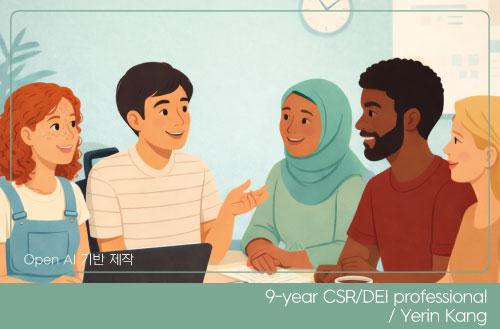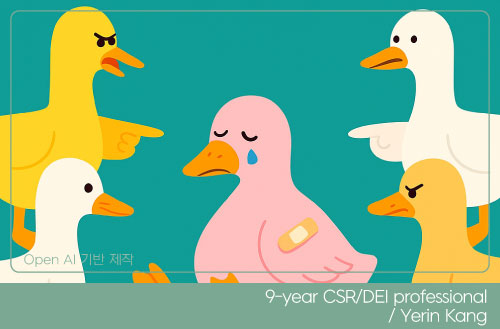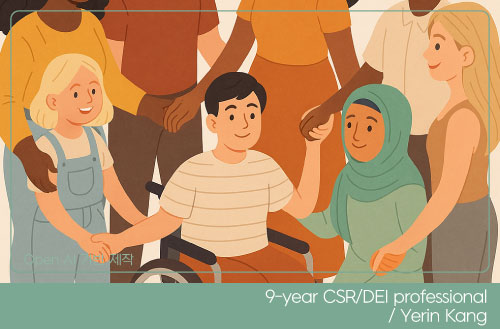

OO Genius, What am I?
Journey to Discovering ‘Selfness’ #2

Columnist
Kang Yerin CSR Team

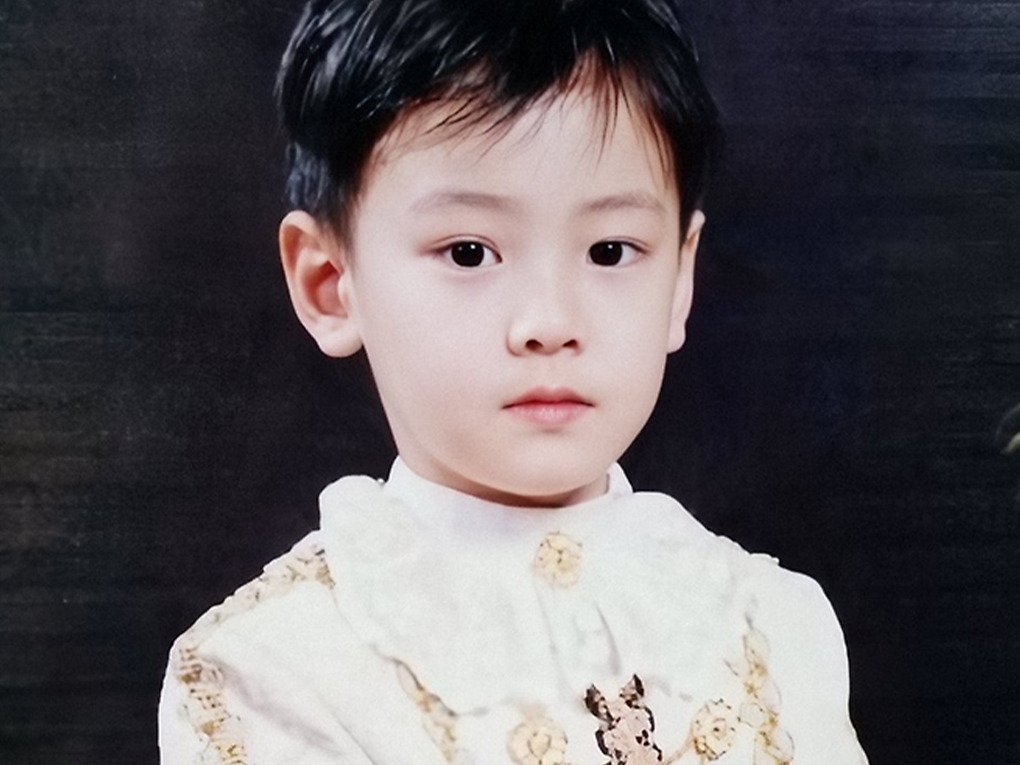
Childhood of ㅇㅇㅇ / Source : Google
#INTRO
Who might this handsome young boy be?
Cha Eun-woo invariably comes to mind when one thinks of a handsome celebrity these days. It appears he was born with those striking good looks.
Starting this column with a photo of the immensely photogenic Cha Eun-woo is admittedly a bit self-indulgent. Commonly hailed as a "face genius," his overwhelming visual appeal speaks for itself. This concept of a "genius" pertains to someone inherently gifted, possessing talents far surpassing those of their peers. even during his elementary school days. When I was in elementary school, I used to think about my talent.
"I wonder what I'm good at. Art? Academics? Piano?... It seems like nothing!"
Like Cha Eun-woo, neither a music prodigy nor a sports virtuoso from a young age, many of us face similar uncertainties. These doubts resurface when entering the job market.
"What should I highlight as my strength in my cover letter?" "What kind of work can I excel at?"
The pondering over one's talents and strengths might seem endless. Discovering and developing what one excels at is crucial in life. Hence, this column will explore 'the journey to discovering selfhood' through the lens of 'talents and strengths.'
1 "Most people live their lives without knowing their talents and strengths."
According to the Standard Korean Dictionary, 'talent (재능)' refers to the natural ability and skills required for specific tasks, encompassing both innate and acquired capabilities through training. 'Strength (강점),' on the other hand, indicates a superiority or excellence over others.
As Gallup Press's Now, Discover Your Strengths describes, the formula 'Talent X Investment = Strength' applies here. If a person with a talent score of 2 invests an effort of 5, their strength might be 10. Conversely, someone with a talent score of 5 making the same investment could see their strength soar to 25 — five times greater than in the first scenario.
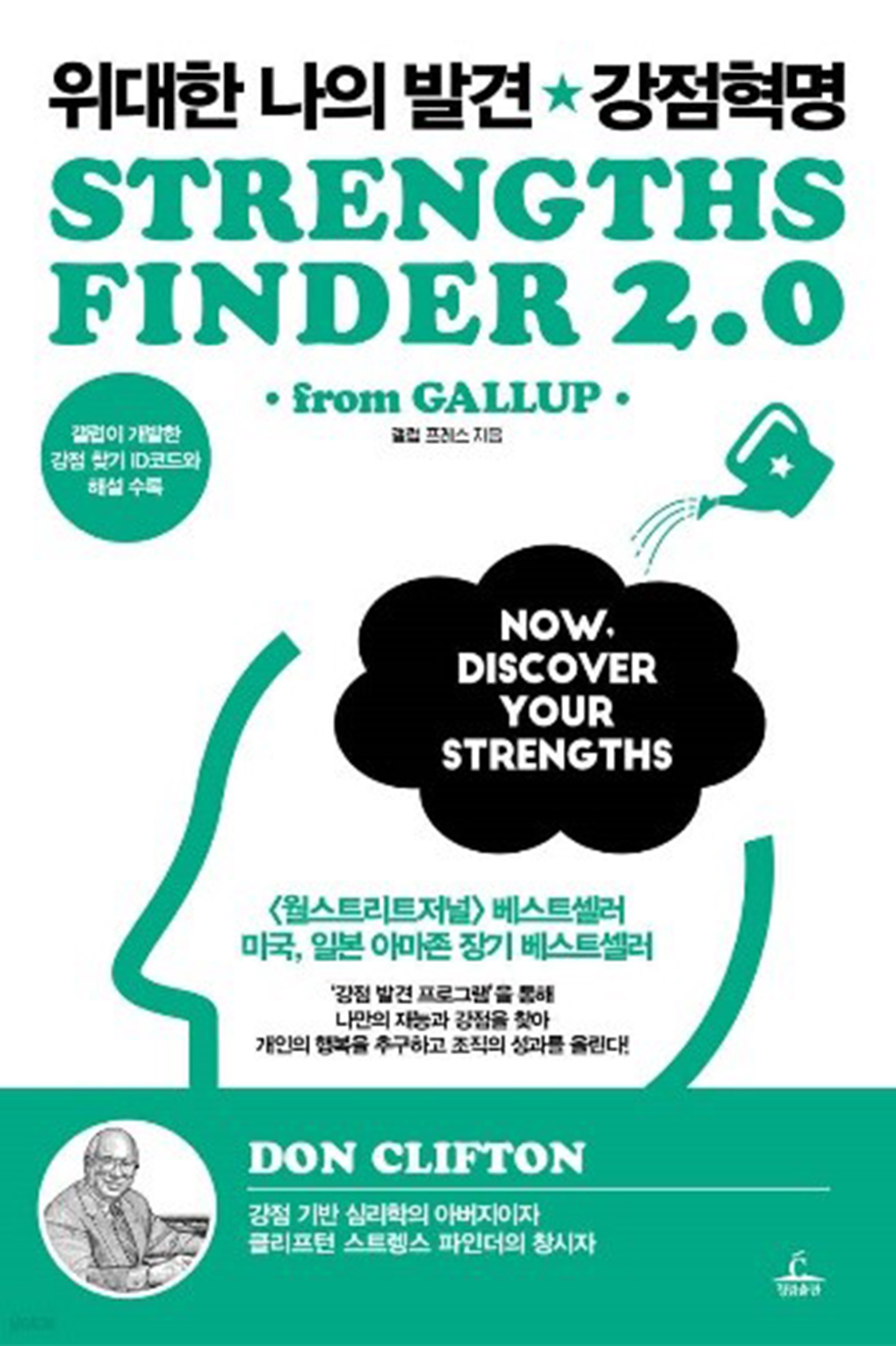
Source: 'Now, Discover Your Strengths' Book Introduction on NAVER
Everyone possesses unique talents, and continuously investing in knowledge and skills can transform these into strengths. Properly utilizing one's talent can quickly convert time invested into productive strengths. For instance, someone with an exceptional talent for persuasion might thrive as a salesperson, achieving high results with minimal time and effort. Adequate investment in one's talents is the most efficient way to build true strength, which involves identifying and refining one's most remarkable abilities.
Yet, most people neither utilize their talents and strengths effectively nor even recognize what they are. Instead, they spend their lives focusing on compensating for their weaknesses. In contrast, many successful individuals concentrate on enhancing their ‘strengths.’ In surveying a thousand influential American leaders, leadership expert John Maxwell explored how they allocate their time with intriguing results. How much time do you devote to each of these three categories?
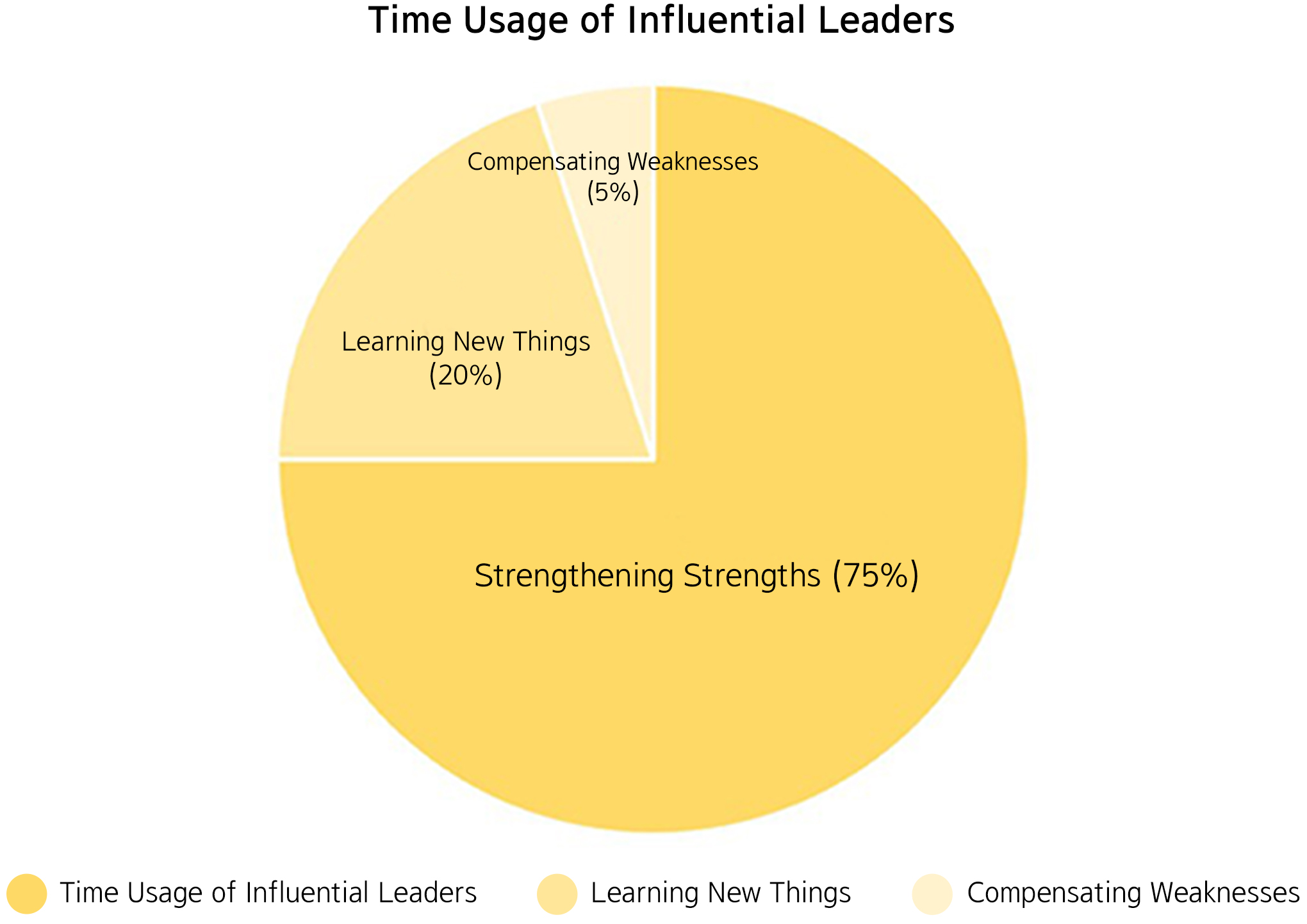
Domestically, there’s a comparable example worth mentioning. Have you been watching the newly revived ‘A Clean Sweep’? One of the show’s highlights is pitcher Yoo Hee-kwan, famously known at one point as ‘the slowest pitcher in the history of Korean professional baseball.’ Remarkably, he has notched a consistent record of eight consecutive years of ten wins, totaling 101 wins. Instead of trying to unnaturally increase his slow pitching speed, Yoo focused on enhancing his strong point: his control. This approach minimized his walks and allowed him to dominate the psychological battles against batters, effectively stealing their timing. He cultivated a unique distinction as a player whose pitches might be slow but whose strategic thinking outpaced everyone else. Would Yoo have achieved anything beyond mediocrity if he concentrated solely on improving his weaknesses?
It's worth considering whether you're overly focused on compensating for your weaknesses rather than leveraging your talents into strengths. I want to introduce a few enlightening assessments and methods to aid in such reflection.
2 What are my top 5 strengths? The Gallup Strengths Finder!
The Gallup Strengths Finder developed its questionnaire by analyzing thirty-four reasons behind the success of socially accomplished individuals. These thirty-four strengths are categorized into themes.
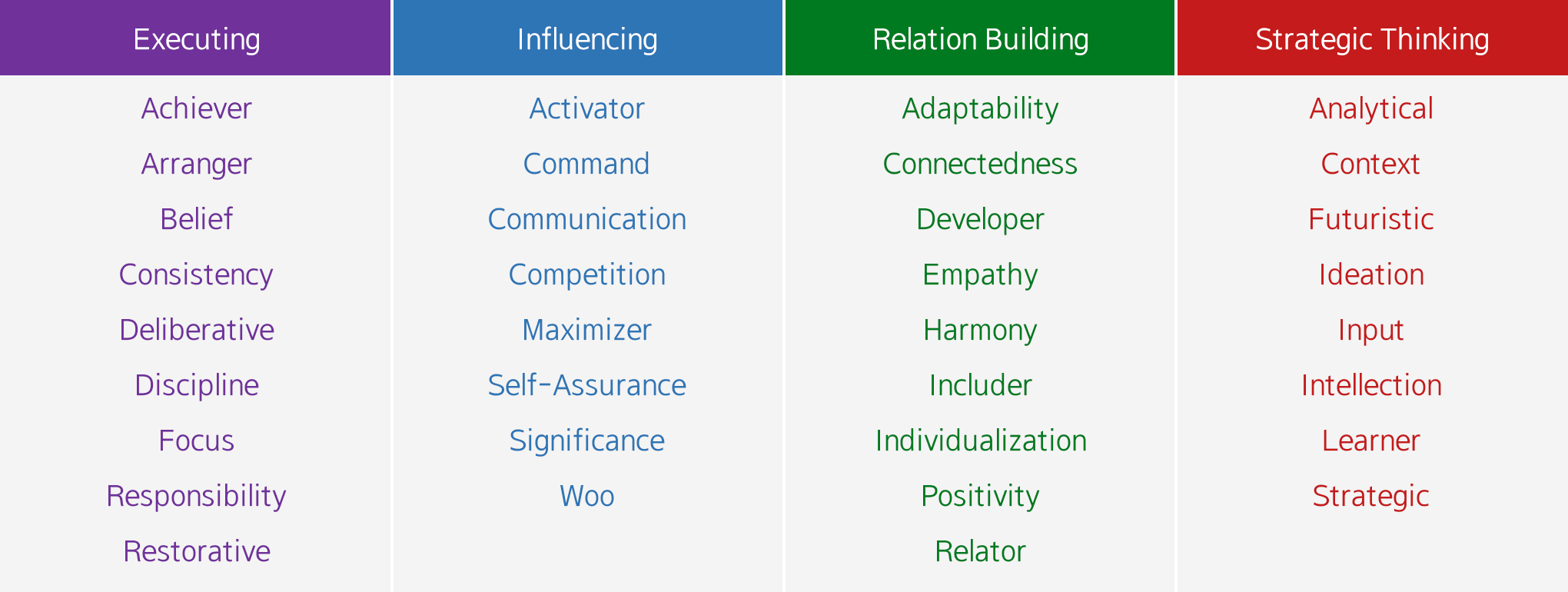
The test options are mainly divided into 'Top 5' and 'All 34', each taking about thirty minutes. However, the range of strengths each reveals varies. The 'Top 5' shows you your five highest-ranking strengths, whereas the 'All 34' ranks your complete strength profile from one to thirty-four.
I had the opportunity to undergo the 'Top 5' assessment during a company workshop and found it reasonably sufficient for identifying my strengths. Here’s a bit more about this diagnostic tool:
The diagnostic can be purchased online, but the book Now, Discover Your Strengths provides a code usable on Gallup's website. The book also offers a detailed exploration of all 34 strength themes, including characteristics, examples, and how to utilize them effectively, making it highly recommendable. After completing the diagnostic, you will receive a report like the one described below:
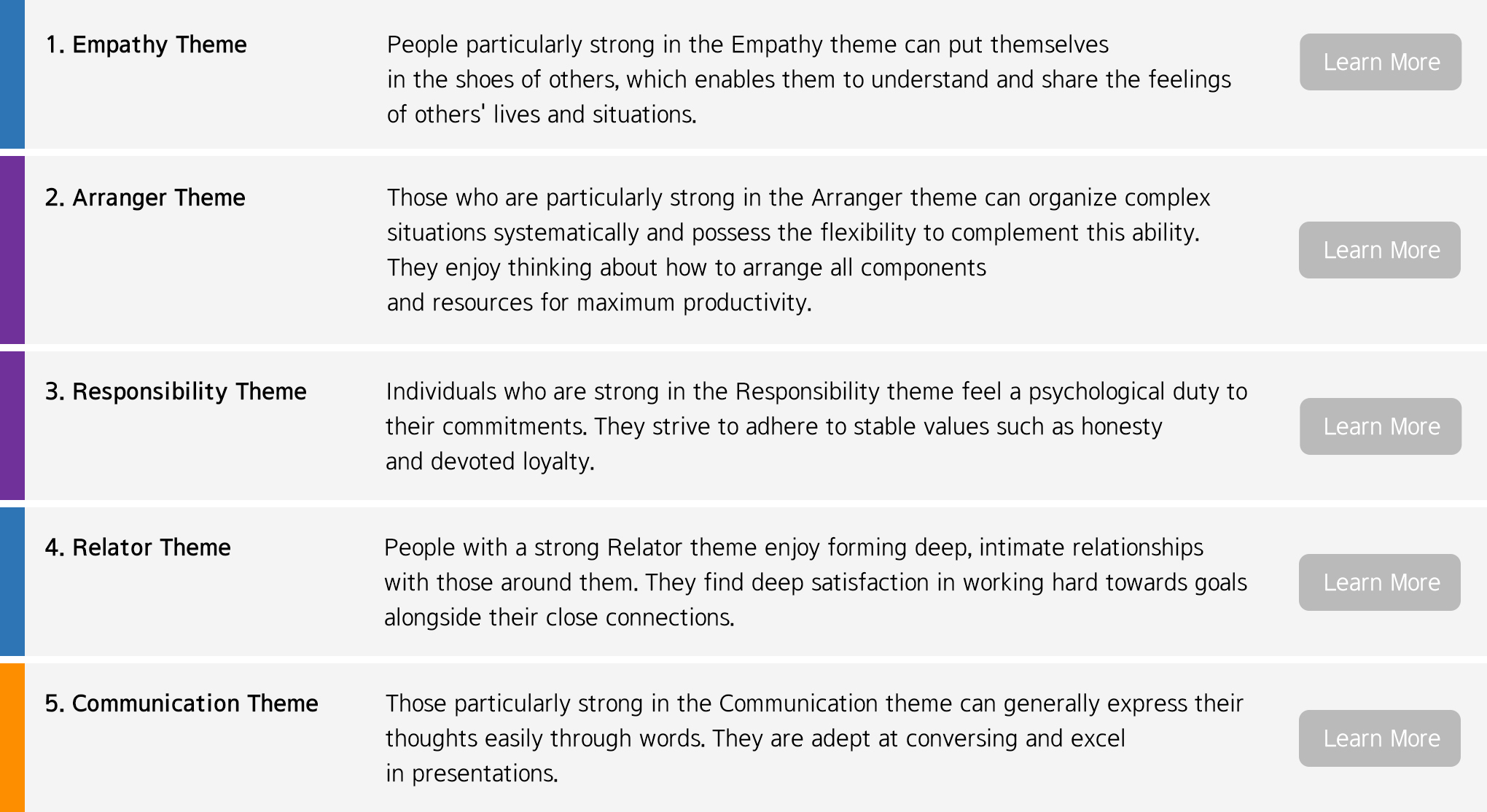
Reference: Sample image reconstructed from the results report
The report lists your top five strengths, and by clicking 'Learn More,' you can learn more about each theme. It also describes how these top five strengths interact, showing, for example, how the 'Arranger' and 'Responsibility' themes can combine to create a particular strength.
This assessment proved helpful in clarifying my career direction and advancing my tasks. It confirmed suspicions about my strengths, giving me the confidence to develop them further through targeted learning. This diagnostic feels more like a tool for identifying professional strengths rather than personal inclinations. For those looking to bolster their business acumen, revisiting and enhancing these identified strengths through this assessment could be incredibly beneficial.
3 Want to Discover and Develop Your Talents into Strengths? Try the Tanagement Assessment!
The term ‘Tanagement’ blends 'Talent' and 'Management'. The Tanagement assessment is a career development tool designed to help you identify and develop your talents into strengths. This tool outlines the interplay and definitions of needs, talents, and strengths.

Source: Tanagement Official Website Sample Report
A ‘need’ refers to an involuntary strong inclination triggered by certain situations. Tanagement identifies the top six out of 24 motivational needs, which correlate to six talents that can be cultivated into strengths. 'A ‘talent’ linked to these needs provides satisfaction and sustainability and accelerates learning—which is vital to developing personal strengths. A ‘strength’ is the combination of these discovered talents, contributing to organizational performance in meaningful ways.
Personal strengths go beyond mere capabilities or skills, which denote what one can do. True strengths emerge when there is an inherent desire to act—a desire that comes naturally, does not need external prompts, and can be easily learned or mimicked. Appropriate skills and attitudes back these.
Identifying talents that affect satisfaction, sustainability, and learning pace is crucial. With the proper training in knowledge and experience, these talents can evolve into strengths that significantly contribute to team or organizational success. Moreover, the impact of talents and strengths can be enhanced or diminished by attitudes, making diagnosing and managing them essential. Developing these aspects helps individuals realize their unique excellence, deepen self-understanding, and restore self-esteem.
Through such assessments, I could see my six strongest needs-linked ‘talents,’ eight distinct and competitive ‘strengths,’ twelve ‘attitudes’ affecting my strengths, and a career model utilizing these strengths.
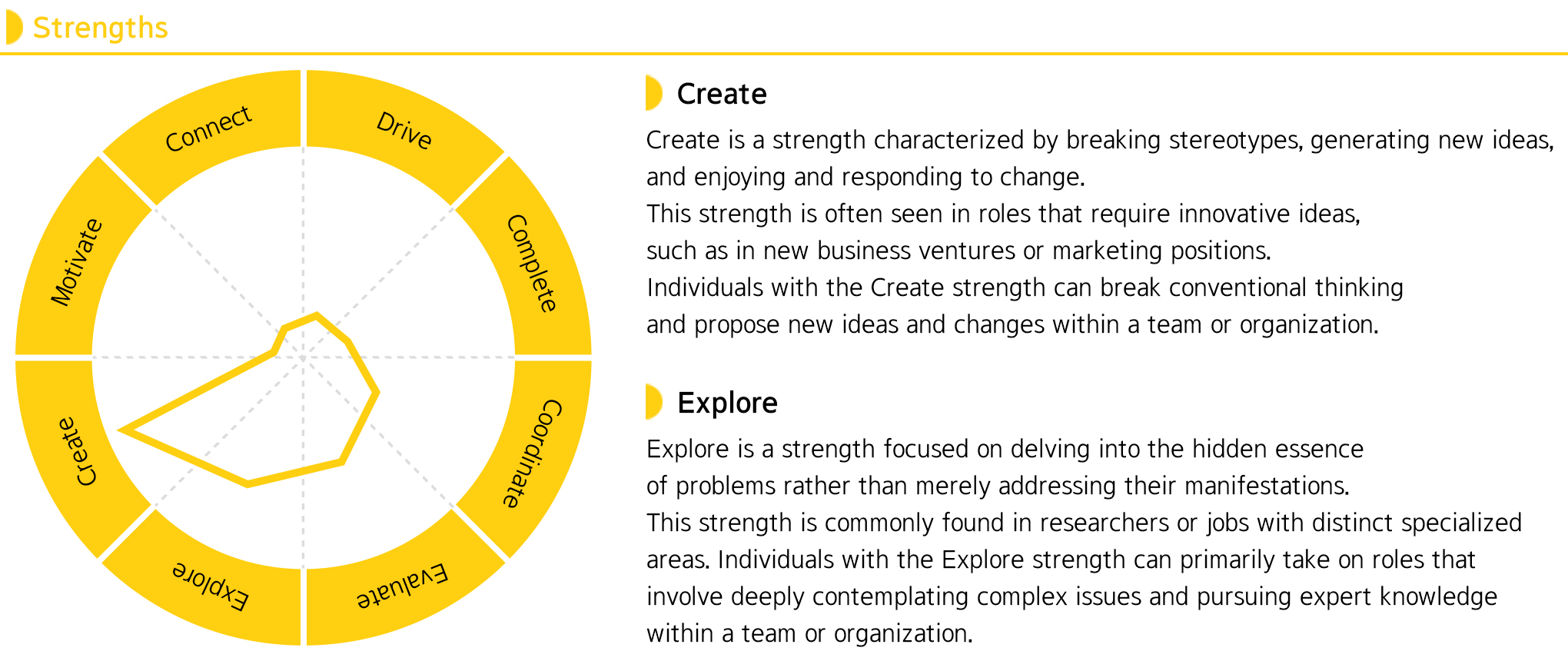
Source: Tanagement Official Website Sample Report
When examining strengths in detail, they are categorized into eight sections: Create, Motivate, Connect, Drive, Complete, Coordinate, Evaluate, and Explore. Two most dominant strengths in the assessment results come with an in-depth description and a guide on effectively using them, as illustrated in the sample image.
A unique feature of this test is the measurement of 'Judgment-based' strengths. Need-based strengths are innate and enable relatively fast learning and growth when utilized. However, judgment-based strengths are those considered correct due to organizational demands or the environment one has grown up in, or they are learned.
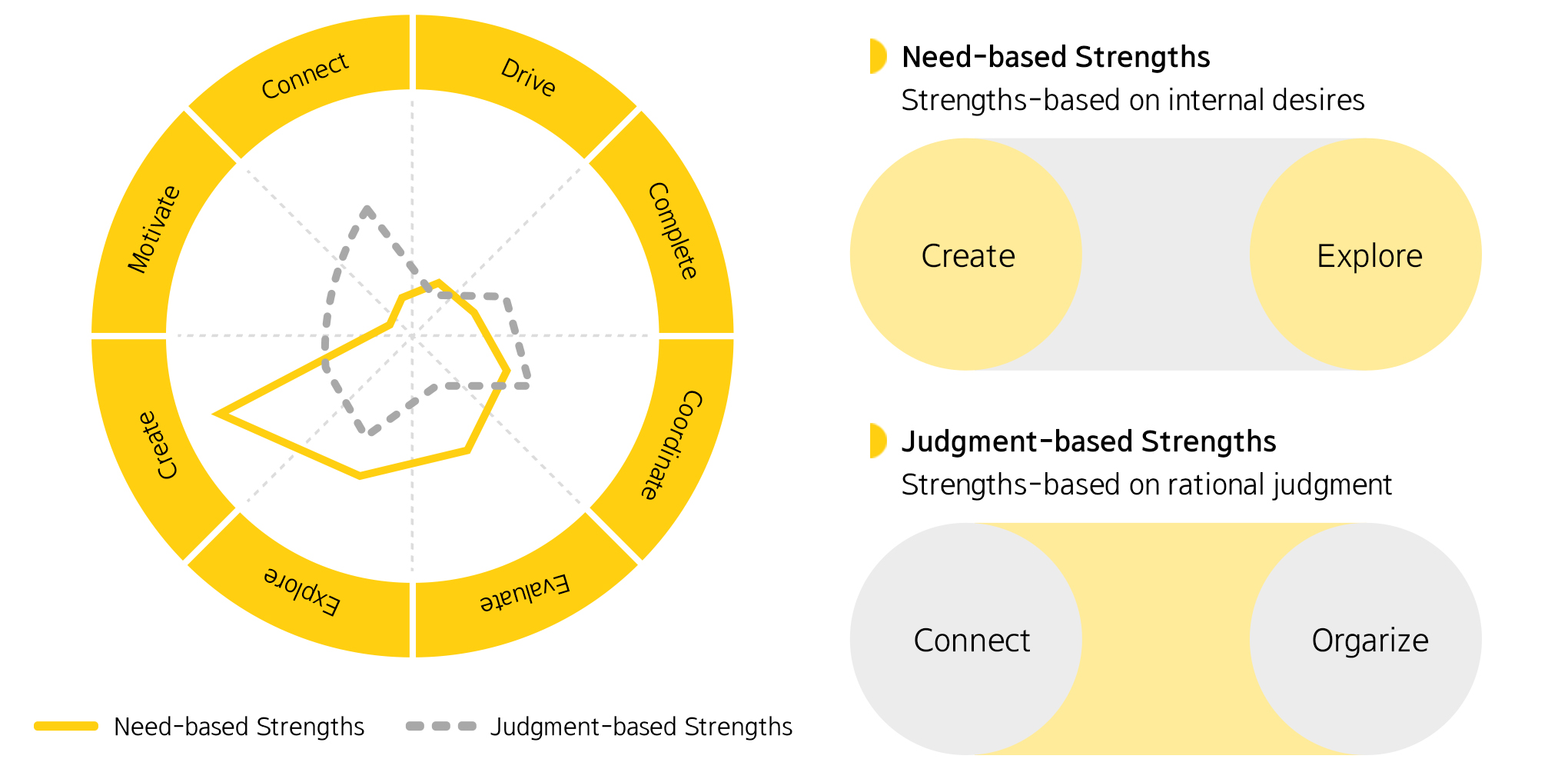
Source: Tanagement Official Website Sample Report
If judgment-based strengths score high, but the underlying need-based strengths are low, it suggests these strengths have been developed over time without a strong inherent desire. Such strengths can deliver satisfactory outcomes in the short term, but sustaining exceptional performance over the long haul can be challenging without supporting underlying needs, potentially leading to burnout. Thus, it is vital to clearly understand and intentionally utilize strengths based on one's needs to achieve consistent and outstanding results.
The Tanagement questionnaire is divided into three parts and takes about 45 minutes to complete. Signing up on the official site grants one free test, with subsequent tests available for purchase. Planning via this assessment is highly recommended for those eager to uncover and enhance their innate talents into strengths.
4 Want to Discover Yourself? Questions to Explore 'Talents and Strengths' Suggested by ChatGPT
In previous segments, I've introduced a couple of assessments. However, the thought occurred to me: can we not explore our talents and strengths in everyday life? So, I consulted the genius of our times, ChatGPT, and here's what it advised.
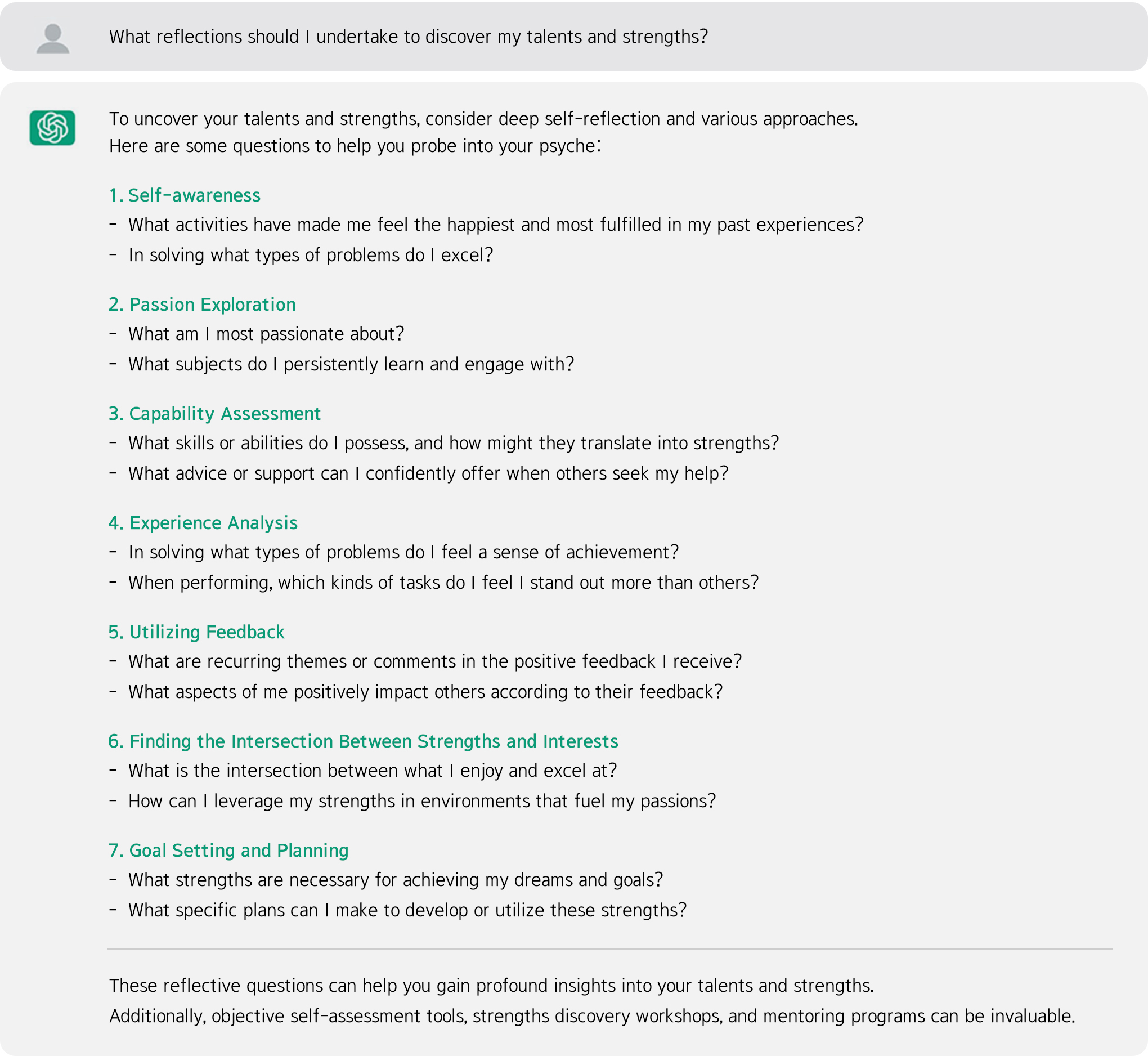
Which questions caught your eye? For me, two were particularly striking:
"What advice or support can I confidently offer when others seek my help?"
"What are recurring themes or comments in the positive feedback I receive?"
Considering my strengths from others' perspectives was enlightening. It led me to reflect on when I've achieved exceptional results or received praise and which areas these were in. Contemplating whether I could confidently advise or support in these positively reviewed areas was also thought-provoking. If you feel confident, you can; perhaps you've identified a strength. Why not see which questions resonate with you?
Engaging in self-questioning to uncover unknown strengths might be among the most crucial and necessary moments in your life.
#OUTRO
The second column of the journey to discovering ‘selfness’ opened with the 'face genius' Cha Eun-woo and explored 'Talents and Strengths.' Even if we are not all face geniuses, each of us is a 'genius' in our own right, possessing at least one talent. If you haven't discovered yours yet, it’s merely undiscovered, not absent! And you can develop those talents into strengths. Why not try the methods to explore the talents and strengths introduced in this column? Until the next column, I hope you discover your 'genius.' Thank you.
-
Like
2 -
Recommend
1 -
Thumbs up
1 -
Supporting
1 -
Want follow-up article
1



